Trending Now
We have updated our Privacy Policy and Terms of Use for Eurasia Group and its affiliates, including GZERO Media, to clarify the types of data we collect, how we collect it, how we use data and with whom we share data. By using our website you consent to our Terms and Conditions and Privacy Policy, including the transfer of your personal data to the United States from your country of residence, and our use of cookies described in our Cookie Policy.
{{ subpage.title }}
10 memorable quotes on GZERO World with Ian Bremmer in 2024
On our award-winning weekly global affairs show, GZERO World, Ian Bremmer explains the key global stories of the moment and sits down for in-depth conversations with the newsmakers and thought leaders shaping our world. In no particular order, here’s a look back at the 10 most quotable moments from this year’s episodes.
Adam Grant on how AI is changing the world of work
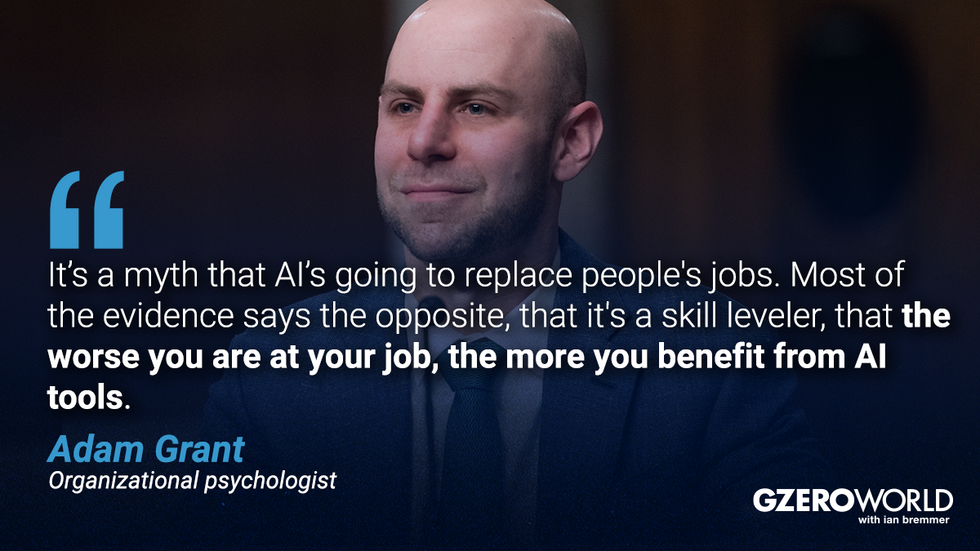
Aired on February 2, 2024
The AI revolution is coming… fast. But what does that mean for your job? Watch Ian Bremmer’s conversation with organizational psychologist Adam Grant.Yuval Noah Harari explains why the world isn't fair (but could be)
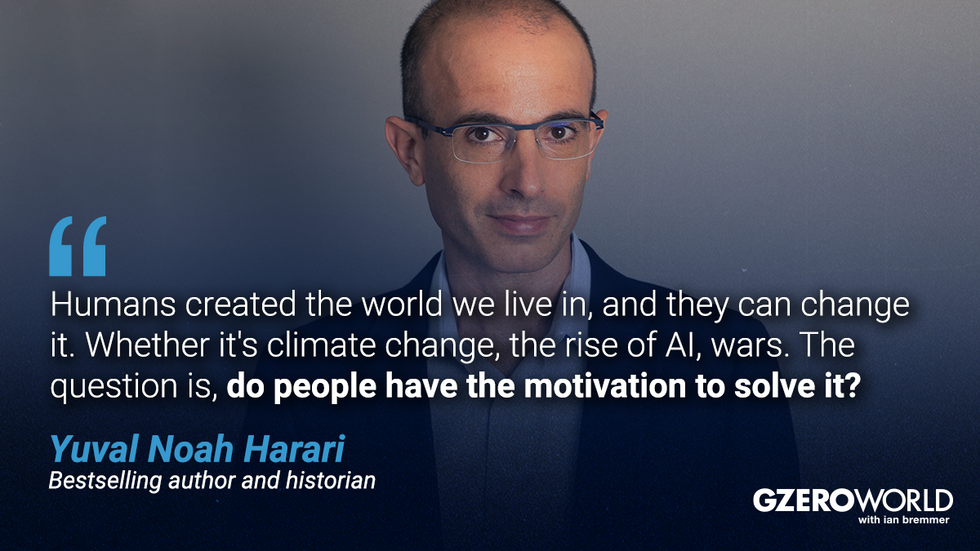
Aired on March 8, 2024
In a conversation filmed live at the historic 92nd Street Y in NYC, Yuval Noah Harari delves into the foundational role of storytelling in human civilization, the existential challenges posed by artificial intelligence, the geopolitical implications of the Ukraine war, and the most pressing questions of the Israeli-Palestinian conflict. Watch the full episode.Thomas L. Friedman on How the Israel-Gaza war could end - if Netanyahu wants it to
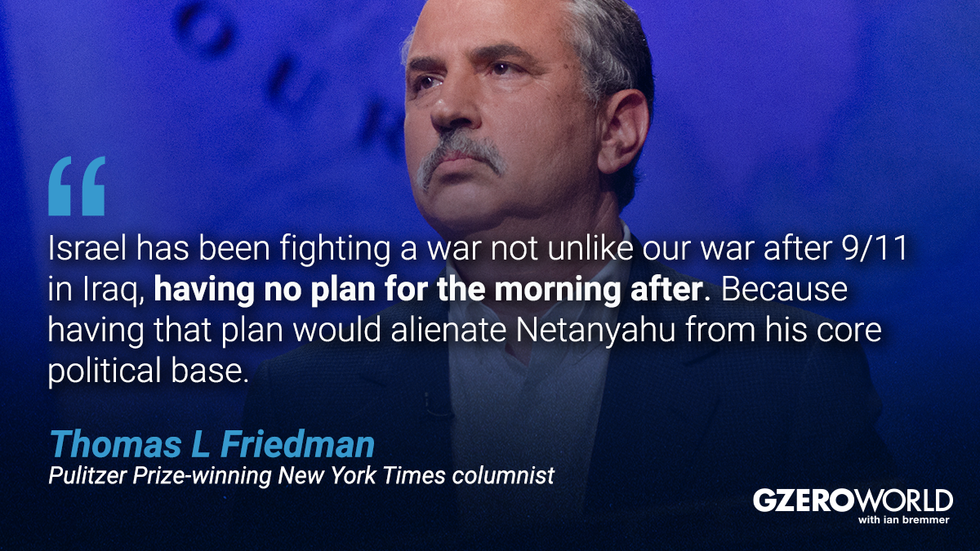
Aired on April 5, 2024
Pulitzer-prize-winning author and New York Times columnist Thomas L. Friedman games out a possible resolution to the war in Gaza and explains why both Israeli Prime Minister Netanyahu and Hamas are obstacles to peace. Watch the full episode.
Emily Bazelon on the major Supreme Court decisions of June 2024
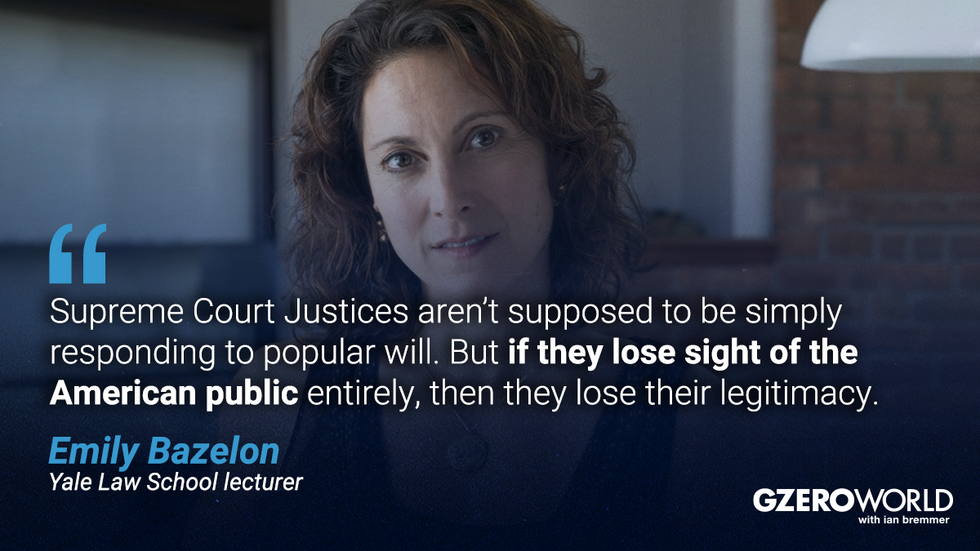
Aired on May 3, 2024
Yale legal scholar and New York Times Magazine staff writer Emily Bazelon unpacks some of the biggest cases that were on the docket this year and how the rulings will impact Americans. Watch the full episode.
Justice & peace in Gaza: The UN Palestinian ambassador's perspective with Riyad Mansour
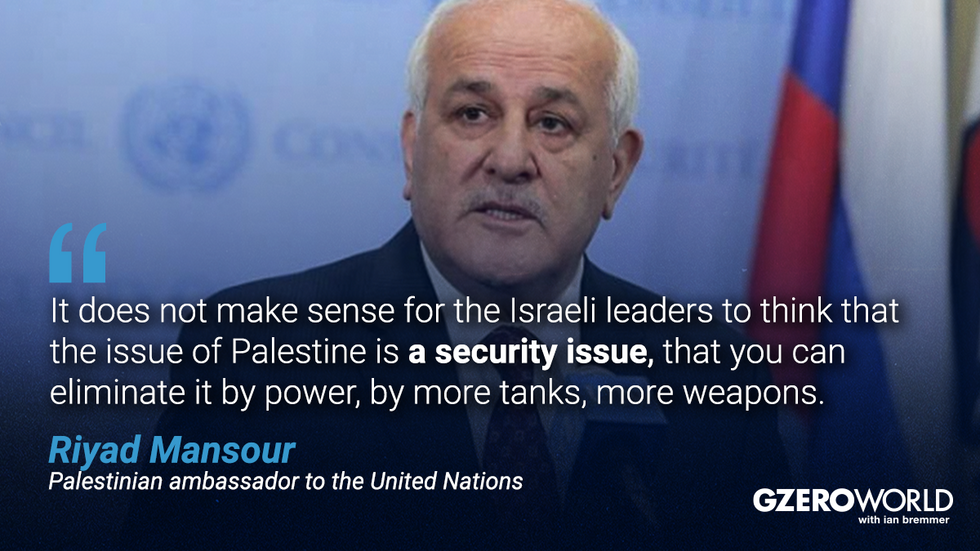
Aired on July 5, 2024
Ian Bremmer sits down with Palestinian Ambassador to the United Nations Riyad Mansour for a candid interview about his role in the UN, the war in Gaza, and how it might end. Watch the full episode.
An exclusive interview with Argentina's radical new president, Javier Milei
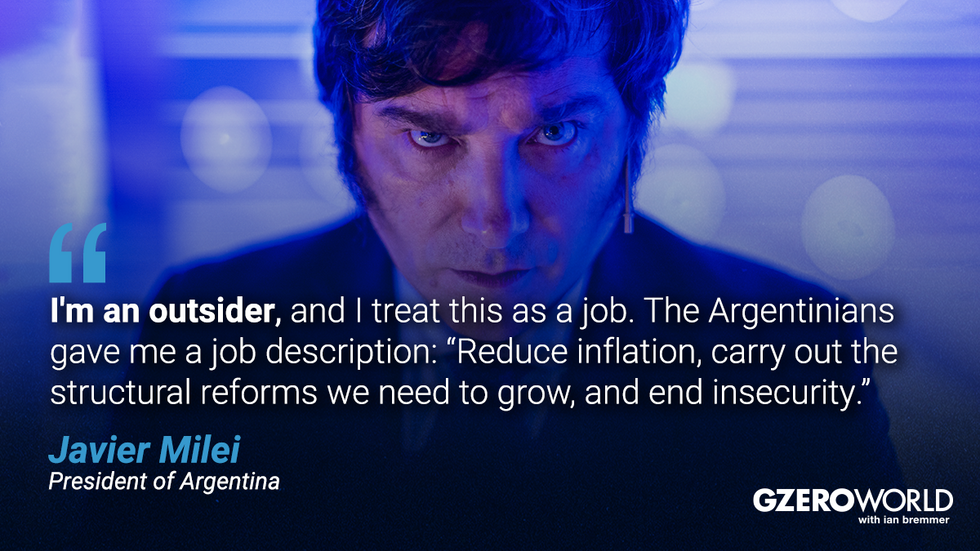
Aired on August 2, 2024
Argentine President Javier Milei defends his radical approach to saving Argentina’s struggling economy, his commitment to aligning with liberal democracies, and his pragmatic stance on international trade and alliances. Watch the full interview.
Why António Guterres believes the UN should lead on AI
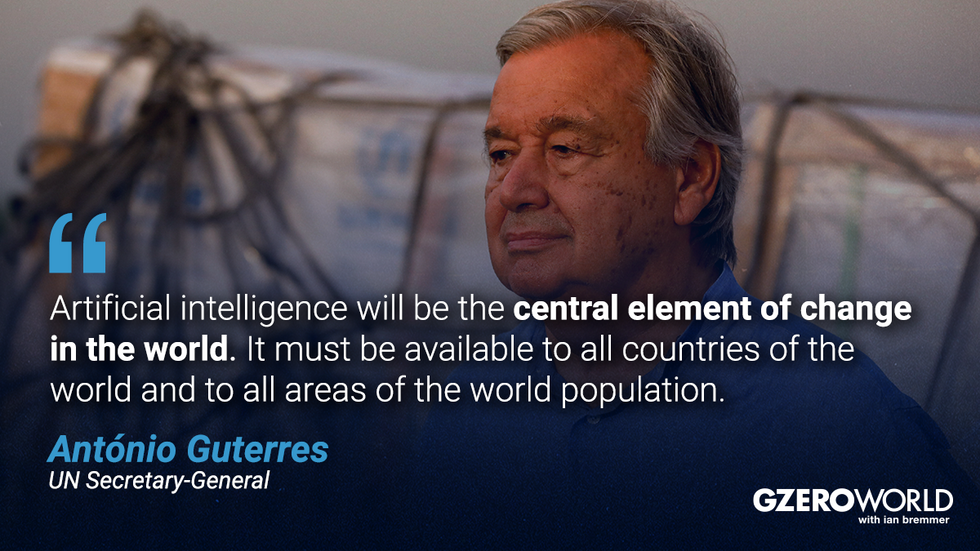
Aired on September 20, 2024
In an exclusive interview for GZERO World, United Nations Secretary-General António Guterres sat with Ian Bremmer on the sidelines of the UN General Assembly to discuss his vision for the future of the UN during his last term in office. Watch the full interview.
Iran's next move: Interview with VP Javad Zarif
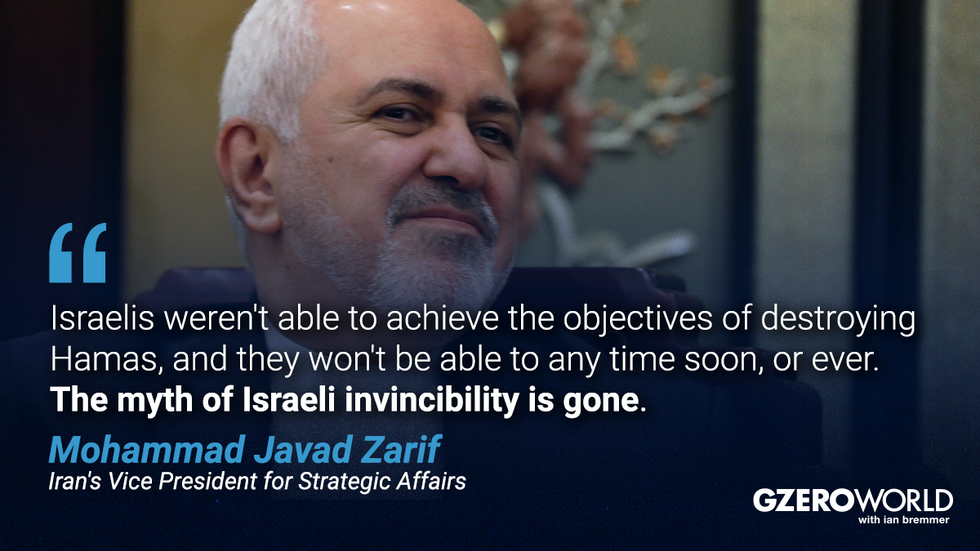
Aired on October 4, 2024
Ian Bremmer sits down with Iran's new Vice President for Strategic Affairs Mohammad Javad Zarif just days before the assassination of Hezbollah leader Hassan Nasrallah to discuss the escalating conflict in the Middle East and where Iran stands. Watch the full episode.
Roberta Metsola on whether Europe can become a global superpower
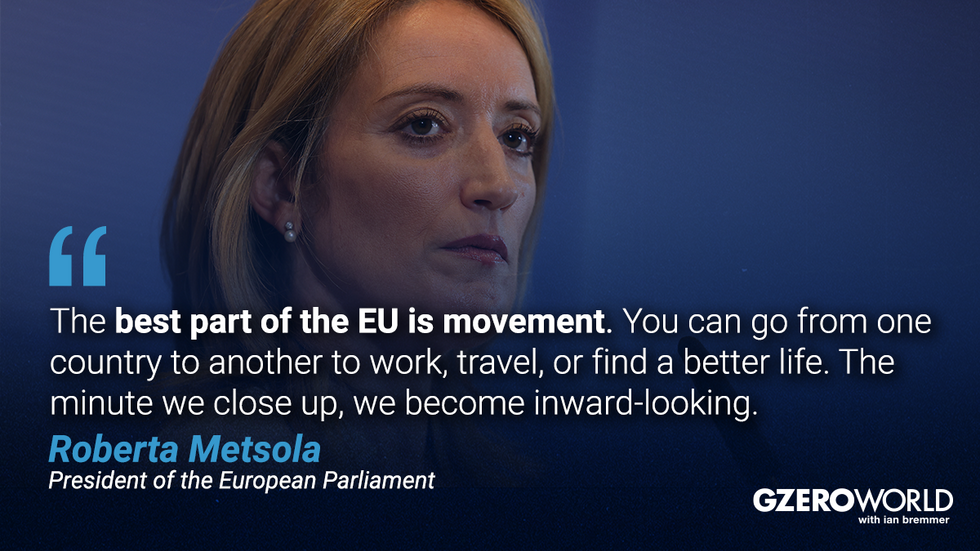
Aired on October 20, 2024
European Parliament President Roberta Metsola discusses Europe’s future amid an ongoing migrant crisis, the war in Ukraine, and an economic slowdown. Can the bloc’s 27 member states stay united? Watch the full episode.
Oren Cass on the case for Trump's tariffs
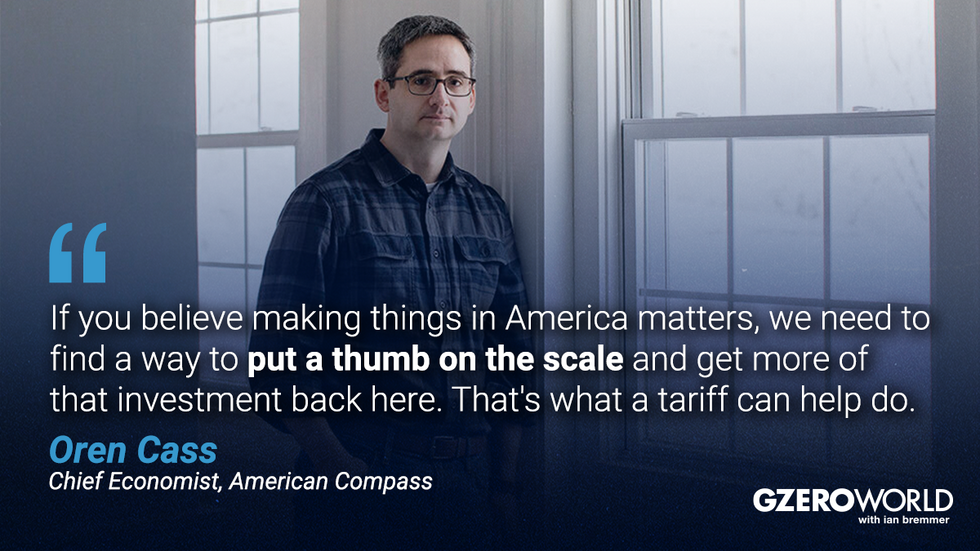
Aired on December 6, 2024
Trump has vowed to raise tariffs, slash business regulation, and deport millions of undocumented immigrants, policies he says will put Americans first. Oren Cass outlines what that will mean practically for workers and consumers. Watch the full episode.
Don’t miss an episode in 2025!
GZERO World airs nationwide on US public television (check local listings), and new digital episodes of GZERO World are released every Monday on YouTube.
CEOs are becoming less powerful, says work expert Adam Grant
CEOs are influential and highly paid, but long hours, high stress, and uncertainty about the future are leading to “CEO burnout” and disinterest in leadership roles among young workers.
CEO is one of the most influential and highly-compensated jobs in the world, but according to organizational psychologist Adam Grant, the overwhelming feeling he senses from business leaders right now is one of “powerlessness.” With so many uncertainties and risks right now—climate change, crumbling democracy, powerful new advances in AI—CEOs are putting their heads down to focus on short-term gains instead of preparing for the long-term futures of their organizations.
On GZERO World, Ian Bremmer asks Grant, who studies leadership and culture in the business world, what he makes of this shift, and whether CEO incentives need to change. Grant sees a growing disinterest among young workers in taking on leadership roles, pointing to long hours, short tenures, and a growing sense that it’s unclear how much good they can do, if any, from the executive c-suite. All this contributes to what Grant calls “CEO burnout,” and he said he hopes to see more companies with co-CEOs, which is better for business and workers.
“I think the job [of CEO] is just so big and complex that it’s hard for one person to have all the skills you need,” Grant explains.
Watch full episode: How AI is changing the world of work
Catch GZERO World with Ian Bremmer on US public television every week. Check local listings.
- Hard Numbers: Canada's govvies boom, Americans start to care about the world, CEOs rake in record riches, Fentanyl “superlabs” hum up north, meltdown in Canada-UK cheese talks ›
- US CEOs too influential on China policy, says Rahm Emanuel ›
- What's on the mind of 21st century CEO leaders? ›
- Corporations losing the culture wars — Angela Hofmann ›
How AI is changing the world of work
The AI revolution is coming… fast. But what does that mean for your job? GZERO World with Ian Bremmer takes a deep dive into this exciting and anxiety-inducing new era of generative artificial intelligence. Generative AI tools like ChatGPT and Midjourney have the potential to increase productivity and prosperity massively, but there are also fears of job replacement and unequal access to technology.
Ian Bremmer sat down with tech expert Azeem Azhar and organizational psychologist Adam Grant on the sidelines of the World Economic Forum in Davos, Switzerland to hear how CEOs are already incorporating AI into their businesses, what the future of work might look like as AI tools become more advanced, and what the experts are still getting wrong about the most powerful technology to hit the workforce since the personal computer.
“One of the dangers of last year was that people started to lose their faith in technology and technology is what provides prosperity,” Azhar says, “We need to have more grownup conversations, more civil conversations, more moderate conversations about what that reality is.
Catch GZERO World with Ian Bremmer on US public television every week or on US public television. Check local listings.
- AI at the tipping point: danger to information, promise for creativity ›
- Hard Numbers: Must-have accessory?, Americans on AI, Bill Gates’ prediction, Massive paychecks, Airbnb's big bet ›
- Political fortunes, job futures, and billions hang in the balance amid labor unrest ›
- Larry Summers: Which jobs will AI replace? ›
- AI's impact on jobs could lead to global unrest, warns AI expert Marietje Schaake ›
- How neurotech could enhance our brains using AI - GZERO Media ›
- Can AI help doctors act more human? - GZERO Media ›
AI and the future of work: Experts Azeem Azhar and Adam Grant weigh in
Listen:What does this new era of generative artificial intelligence mean for the future of work? On the GZERO World Podcast, Ian Bremmer sits down with tech expert Azeem Azhar and organizational psychologist Adam Grant on the sidelines of the World Economic Forum in Davos, Switzerland, to learn more about how this exciting and anxiety-inducing technology is already changing our lives, what comes next, and what the experts are still getting wrong about the most powerful technology to hit the workforce since the personal computer.
The rapid advances in generative AI tools like ChatGPT, which has only been public for a little over a year, are stirring up excitement and deep anxieties about how we work and if we work. Artificial intelligence can potentially increase productivity and prosperity massively, but there are fears of job replacement and unequal access to technology. Will AI be the productivity booster CEOs hope for, the job killer employees fear?
Subscribe to the GZERO World Podcast on Apple Podcasts, Spotify, Stitcher, or your preferred podcast platform, to receive new episodes as soon as they're published.Rethinking the post-pandemic workplace
While the pandemic continues to ravage much of the world, the rich world is opening back for business and companies are preparing to bring their employees back to the office. But quite a few of those workers don't seem thrilled about a return to pre-COVID workplace norms. A recent survey of 30,000 Americans found that three in ten never want to return to the office again. Another poll found that one in three US workers wouldn't want to work for an employer who requires them to be on site full time. But Wall Street's impatience is starting to show. Take Morgan Stanley CEO James Gorman, who effectively told his New York City employees that they should expect to be back in their cubicles by September, or else. If employers are going to require that their workers return to the office, what should those workers expect in return?
Watch the episode: Adam Grant reimagines work after COVID
- The Graphic Truth: New digital jobs in a post-pandemic world ... ›
- “Essential workers” and the inequality of work - GZERO Media ›
- Adam Grant on post-pandemic WFH: CEOs still don't get it - GZERO ... ›
- Podcast: Adam Grant reimagines work after COVID - GZERO Media ›
- Work in 60 Seconds: Company Culture - GZERO Media ›
Lightning round: Adam Grant on fun at work and jargon monoxide
In our GZERO World "Lightning Round," organization psychologist Adam Grant shares his thoughts on how to disconnect from work, what is and isn't fun in the workplace, and why people use work jargon."There's some hilarious research which shows that people use that kind of jargon because they're insecure and they want to sound smart," observes Grant, author of "Think Again: The Power of Knowing What You Don't Know."
Watch the episode: Adam Grant reimagines work after COVID
“Essential workers” and the inequality of work
Organizational psychologist Adam Grant discusses the "essential workers" who kept the world going throughout the pandemic and didn't get to work from home. According to Grant, the US should be rethinking its policy on essential work. "Where was hazard pay for all the teachers? For all the medical professionals? For all the warehouse workers who put their lives at risk to keep the world running, and to try to keep the economy alive as well?" asked Grant, in an interview with Ian Bremmer on GZERO World.
Watch the episode: Adam Grant reimagines work after COVID
Adam Grant reimagines work after COVID
As the pandemic recedes in some parts of the world, many employers—from Fortune 500 CEOs to small business owners—are bringing their workers back to the office full time. The thing is, not all of those employees want to go back. On GZERO World, Ian Bremmer speaks with renowned organizational psychologist Adam Grant about how to reimagine "work" in a post-pandemic world. Plus, a look at how the paid family leave benefits in the United States stack up to other developed nations (hint: not so great).
- 2.6 billion people: “WTF is WFH?” - GZERO Media ›
- Adam Grant on post-pandemic WFH: CEOs still don't get it - GZERO ... ›
- The Graphic Truth: Can we work only 4 days a week? - GZERO Media ›
- Work in 60 Seconds: Company Culture - GZERO Media ›
- The Graphic Truth: New digital jobs in a post-pandemic world ... ›





